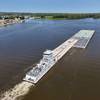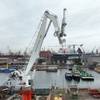CG Cape Wind Radar Study Findings
As a cooperating agency with the Department of the Interior's Minerals Management Service, the U.S. Coast Guard is providing an assessment on the proposed Cape Wind project's impacts to Coast Guard missions and the potential impacts the project may have on navigational safety.
In Oct. 2008, Capt. Raymond Perry, the commanding officer of Coast Guard Sector Southeastern New England, determined that for Coast Guard officials to make a recommendation to the Minerals Management Service, they needed more information on how the proposed project would impact the safety of navigation, particularly how it would affect marine radar.
Conflicting data from previous radar studies prompted the Coast Guard to contract an independent study on how the wind turbine generators may impact marine radar systems and navigation on vessels operating in the area.
In a continuing effort to share information, Coast Guard officials participated in a telephone conference with key Nantucket Sound waterways users. The goal of the conference, led by Perry, was to share the outcome of that study with those who operate in Nantucket Sound, where the farm is proposed to be built.
In addition to the radar study, the Coast Guard evaluated hazards mariners may face if the wind farm is constructed. The Coast Guard looked at the proximity of the wind farm to shipping lanes, hazards to fishing vessels when navigating with gear and nets extended, marking and labeling the wind towers in accordance with standard aids to navigation policy, and the impact of ice build up on the turbines.
Additionally, the Coast Guard evaluated the impact, if any, that the proposed wind energy facility may have on Coast Guard missions, such as search and rescue. With the exception of the radar study, those findings were submitted by Coast Guard Headquarters to the Minerals Management Service on Nov. 14, 2008.
After receiving input from key Nantucket Sound waterways users, Perry will forward a recommendation that will be routed to Coast Guard Headquarters. From there, the recommendation will be transmitted to the Minerals Management Service for their consideration.
Approval authority for the wind farm lies with the Minerals Management Service, the lead federal permitting agency for the project.















